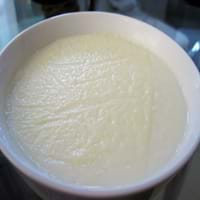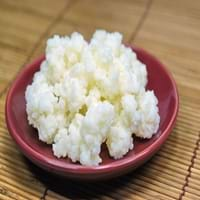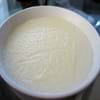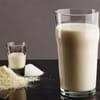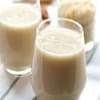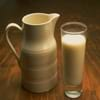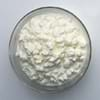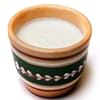Milk Skin vs Kefir
Calories
Calories in 1 pat
298.00 Kcal
8
Not Available
Calories per 100g
123.00 Kcal
99+
41.00 Kcal
99+
Calories in 1 tbsp
18.00 Kcal
6
Not Available
Calories in 1 cup
37.00 Kcal
4
Not Available
Calories in 1 stick
Not Available
Not Available
Serving size
100
100
Proteins
3.13 g
99+
3.79 g
99+
Carbs
4.73 g
99+
4.48 g
99+
Fiber
0.00 g
15
0.00 g
15
Sugar
4.13 g
37
4.61 g
99+
Fats
10.39 g
99+
0.93 g
7
Saturated Fat
7.03 g
99+
0.66 g
7
Trans Fat
0.46 g
5
0.04 g
1
Polyunsaturated Fat
0.55 g
99+
0.05 g
99+
Monounsaturated Fat
3.32 g
99+
0.31 g
99+
Nutrition
Serving Size
100
100
Cholesterol
35.00 mg
34
5.00 mg
99+
Vitamins
Vitamin A
354.00 IU
99+
569.00 IU
32
Vitamin B1 (Thiamin)
0.03 mg
27
0.03 mg
27
Vitamin B2 (Riboflavin)
0.19 mg
99+
0.14 mg
99+
Vitamin B3 (Niacin)
0.11 mg
35
0.15 mg
28
Vitamin B6 (Pyridoxine)
0.05 mg
36
0.06 mg
31
Vitamin B9 (Folic acid, Folate)
3.00 µg
38
13.00 µg
20
Vitamin B12 (Cobalamin)
0.19 µg
99+
0.29 µg
99+
Vitamin C (Ascorbic acid)
0.90 mg
17
0.20 mg
27
Vitamin D
2.00 IU
32
41.00 IU
12
Vitamin D (D2+D3)
0.00 µg
18
1.00 µg
7
Vitamin E (Alpha- Tocopherol)
0.25 mg
24
0.02 mg
39
Vitamin K (Phylloquinone)
1.30 µg
19
0.10 µg
26
Minerals
Calcium
107.00 mg
99+
130.00 mg
99+
Iron
0.05 mg
99+
0.04 mg
99+
Magnesium
10.00 mg
99+
12.00 mg
35
Phosphorus
95.00 mg
99+
105.00 mg
99+
Potassium
132.00 mg
99+
164.00 mg
34
Sodium
61.00 mg
99+
40.00 mg
99+
Zinc
0.39 mg
99+
0.46 mg
99+
Other
Water
81.12 g
90.07 g
Caffeine
0.00 g
0.00 g
Benefits
Health Benefits
Strong & healthy muscles, Helps to gain weight, Aids hangover, Provides energy
Aids in gut easing, gastrointestinal problems and digestion, High digestability, Best for weight loss
Other General Benefits
Not Available
Remedy for stress & anxiety, Boosts immune system, Improves digestion, Presence of calcium, Provides energy, Supports Detoxification
Hair and Beauty Benefits
Skin Care
Gives a smoother skin, Lightens the skin tone, Natural moisturizer, Natural skin softner, Protects the skin against dryness
Gives a smoother skin
Hair Care
Excellent hair conditioner, Results in shiny hair
Strengthens hair roots
Nutritional Importance & Uses
Uses
It is used in the manufacture of soaps and mositurizers, Pre-Shampoo conditioner
Soothes your feet, Used as an Infant Formula in Russia
Nutritional Importance
Good source of calories, Good source of protein
Good source of Calcium, Good source of protein
Allergy
Milk Skin and Kefir Allergy Symptoms
Constipation, Cramps, Gas, Headache, Hives, Itchy Skin rashes, Rashes in the form of hives, Vomiting, Wheezing
Not Available
What is
What is
Milk skin refers to sticky skin of protein that forms on the top of milk and milk containing liquids.
Kefir is fermented milk made by using kefir grains containing benefiicial yeast as well as probiotic bacteria found in the yogurt.
Color
White
Not Available
Milk Skin and Kefir Flavor
Creamy, Milky, Thick
Yeasty
Milk Skin and Kefir Aroma
Milky
Milky
Vegetarian
Yes
Yes
Origin
Japan
North Caucasus regions
How to make
Serving Size
100
100
Ingredients
Milk
Kefir seeds, Whole milk
Fermentation Agent
Not Applicable
Not Applicable
Things you need
Container
Glass container with lid, Cheesecloth, Strainer
Time Duration
Preparation Time
Not Applicable
10- 12 hours
Cooking Time
15
20
Aging time
Not Applicable
Not Available
Storage & Shelf Life
Refrigeration Temperature
39.20 °F
19
99.00 °F
5
Shelf Life
1 Month
2- 3 weeks
